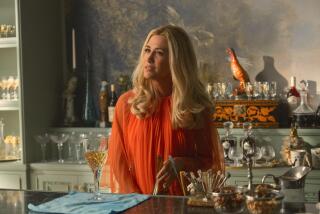Marjorie Kellogg, 83; Wrote ‘Junie Moon’ Novel, Script
- Share via
Marjorie Kellogg, who wrote the novel and screenplay for “Tell Me That You Love Me, Junie Moon,” about three disabled people who become family to one another, has died. She was 83.
Kellogg died Dec. 19 of complications from Alzheimer’s disease at her home in Santa Barbara, said her longtime companion, Sylvia Short.
Many of Kellogg’s characters and stories came out of her experiences as a New York City social worker in the 1960s. She saw a link between the methods of a writer and a caseworker.
“Where the writer and the social worker attempt to understand another human being, our tools and methods are quite similar,” Kellogg said in a 1975 lecture at Smith College, her alma mater. Among other similarities, she said, “we search for the roots of character motivation amid the tangle of the past.”
In her 1968 novel “Junie Moon,” an abused woman who is hospitalized with severe burns meets two men. One is in a wheelchair after being shot and the other has a brain disease. They decide to share a house and take care of one another.
The novel is “funny, sardonic, occasionally biting, more often tender,” a New York Times reviewer wrote in 1968. He referred to the book as a “most affecting work of fiction.”
Otto Preminger directed the film version, starring Liza Minnelli and Ken Howard, which many critics found heavy-handed.
“Even though Kellogg wrote the script, the rendering is all Preminger’s and restraint and understatement are not qualities he trusts,” Los Angeles Times critic Charles Champlin wrote in 1970.
Kellogg wrote another novel in 1972, “Like the Lion’s Tooth,” about three emotionally disturbed children. Critical reviews were mixed.
She also wrote the screen adaptation of Sylvia Plath’s novel “The Bell Jar.” Marilyn Hassett played the emotionally fragile Esther Greenwood, a character based on Plath, while Julie Harris played Greenwood’s mother. The 1979 film received mixed reviews.
From then on, Kellogg focused on writing plays with mental and physical illness as a main theme.
“The Smile of the Cardboard Man,” staged in 1978, showed the frustrations of people who rely on social services in dealing with the public health system. During rehearsals, Kellogg met Short, an actress in the original New York City production, and they became a couple soon afterward. Short is Kellogg’s only survivor.
Most of Kellogg’s plays from the 1970s and ‘80s received premieres in off-Broadway theaters.
She and Short moved to Santa Barbara in 1989 after Kellogg inherited several acres owned by her family. Her last play, “Castaway,” was performed in 1997 by the Ensemble Theatre Company in Santa Barbara and tells the story of a young woman in psychotherapy.
“Basically, I’m interested in survival, in how people survive catastrophe or near-catastrophe,” Kellogg said in a 1997 interview with The Times. “I think that’s what it is all about for all of us.”
Born on a Santa Barbara ranch, she was the daughter of Eugene Kellogg and was a member of the dynasty that founded Kellogg cereals. She attended UC Berkeley but dropped out and took a job as a copy editor at the San Francisco Chronicle.
She began her writing career collaborating on a pulp fiction novel with her friend Paula Fox, who later wrote several popular novels.
“The more we wrote, the more ribald our plot became,” Kellogg said. They quickly lost interest in the project.
At the end of World War II, Kellogg was hired as a European correspondent for Salute magazine. After several years in Europe, she returned to the U.S. and earned bachelor’s and master’s degrees in social work at Smith College in Northampton, Mass., completing her studies in 1953.
She was a social worker in New York City, where she worked at several hospitals, including Columbia University College of Physicians and Surgeons. She continued writing fiction, and in the 1950s wrote several plays for television, including “Rain in the Morning,” a 1957 episode of “Matinee Theatre.”
Kellogg became a full-time writer in the early 1970s. Social work gave her “great gulps of the real world,” she said in 1997, but writing was always her main goal. “I could get up at 4 in the morning and give my best hours to my own stuff.”
More to Read
Sign up for our Book Club newsletter
Get the latest news, events and more from the Los Angeles Times Book Club, and help us get L.A. reading and talking.
You may occasionally receive promotional content from the Los Angeles Times.










